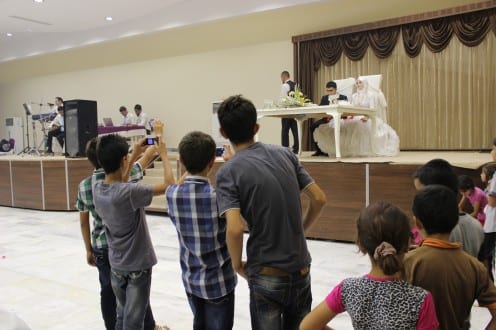Facebook for children?
By Elisabetta Costa, on 14 March 2014

Youth taking photos at a wedding in the Turkey fieldsite (Photo by Elisabetta Costa)
In common with many of our other fieldsites, here in south-east Turkey the sentiment is that Facebook is also not as ‘cool’ as it was before among teenagers. However, as Amber explained in her blog post, the increasing use of other social networking sites does not necessarily mean that Facebook is used less than before. This is a trend in common with findings in our fieldsites in other countries, as UK and Brazil, but the reasons of the change are specific to each field-site. Here people aged between 16 and 19 are telling me that Facebook is not so cool anymore because it is used more and more by younger children. According to the data emerging from my in-depth interviews Facebook is used by a large majority of students (age 6-10) in primary schools to play games and chat with school friends. And it’s used by almost every student (age 11-13) in middle schools. Also in the streets of the town it’s very common to see groups of primary school aged children talking about Facebook, and playing games on Facebook using the smartphone of some older brother or cousin. Adults and parents often describe Facebook as a tool more appropriate to children than adults. And assumptions about Facebook as a media appropriate to play games, to have fun, and not to discuss serious topics or to read news are very common here.
Then, the massive diffusion of Facebook among children is also explained by a positive attitude towards technology in the generation of parents in their twenties and thirties, an attitude that is completely absent among parents in their forties and above. The latter, especially women, are rarely users of social media. Mothers of teenagers are usually ‘digitally illiterate’ housewives with a low level of education. While parents in their twenties and thirties are more educated, they are users of internet and digital media and they do have a more positive attitude towards new technologies. The significant generational gap between the generation of parents in their twenties and thirties, and those in their forties reflects the big economic boom and massive growth of public education experienced by Turkey in the last ten and fifteen years. The evidence emerging from my ethnography is confirmed also by some simple quantitative data: according to data from the Turkish Statistical Institute in the province where my fieldsite is situated, the number of women with a university degree in the age of 30-34 is six times higher (1933) than those in the age of 40-44 (337).
It seems that increased wealth and familiarity with digital technology causes young parents to support the use of social media by their kids. Not only this: the use of smartphone and computers by children play an important role in the affirmation of middle-class status of their family. In this growing consuming economy, the presence of digital technologies in the family plays a very important role within the new hierarchy of taste, in the sense given by Bourdieu (1984).
Thus, in front of the increasing usage of Facebook by children, teen-agers are starting to explore new social media platforms such as WhatsApp and Twitter that are seen as more stylish and trendy, and are used mainly by a narrower group of peer-friends. But Facebook still remains the favourite media to have access to a wider audience, to achieve more popularity, to play games and to communicate with strangers.
2 Responses to “Facebook for children?”
- 1
-
2
Regena wrote on 9 May 2014:
What’s up everyone, it’s my first go to see at this site, and post is in fact fruitful in support of me, keep up posting these types
of posts.
 Close
Close





Blog post from @UCLSocNet detailing Facebook trends amongst children in Turkey http://t.co/nfjn65BzOL